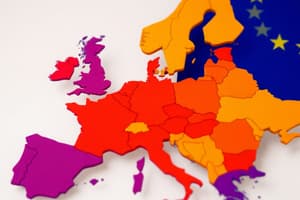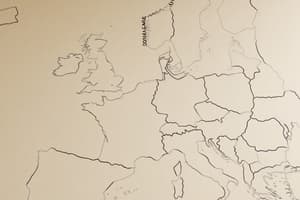Podcast
Questions and Answers
Quelle est la source de la définition du marché intérieur de l'Union européenne?
Quelle est la source de la définition du marché intérieur de l'Union européenne?
- Le Traité de Rome
- Le Traité de Lisbonne
- L'Acte Unique européen (correct)
- Le projet de Paul-Henri Spaak
Quel terme a été remplacé par "marché intérieur" dans le Traité de Lisbonne?
Quel terme a été remplacé par "marché intérieur" dans le Traité de Lisbonne?
- Marché commun (correct)
- Marché intérieur
- Espace sans frontières
- Libre circulation
Quelle est la présentation du marché intérieur dans le Traité de Lisbonne?
Quelle est la présentation du marché intérieur dans le Traité de Lisbonne?
- Les biens sont traités séparément (correct)
- Les biens et les personnes sont traités ensemble
- Les biens et les services sont traités ensemble
- Les biens et le capital sont traités ensemble
Flashcards are hidden until you start studying
Study Notes
-
The goal of the European Union's market interior is to create a space without internal borders where the free movement of goods, people, services, and capital is ensured.
-
This definition of market interior originates from the European Union's Single Act of 1986, which was before the European Union even existed.
-
Prior to the Single Act, the Court of Justice had already established that the market common was an economic integration process at the European level, highlighted by article 2 of the Treaty of Rome, which stated that the goal of the market common was "the elimination of all barriers to inter-community trade in order to achieve a greater degree of economic integration among national markets" (Schul v. Austria, 15/81, EU:C:1982:135).
-
The term "market common" was replaced by "market interior" in the Treaty of Lisbon, which was signed after the failed project of the "market common" was presented by Paul-Henri Spaak in
- The "market interior" project was an attempt to mark a further step in the already accomplished integration of Europe's markets. Today, the market interior concept predominates: the Treaty of Lisbon states that the words "market common" will be replaced by "market interior" in the new Treaty on the Functioning of the European Union.
- The market interior is divided into goods and people, with goods being treated separately in Title III of the third part of the Treaty of Lisbon (on "Internal Policies and Actions of the Union"), while the provisions concerning other beneficiaries of the freedom of circulation are grouped in Title IV. This presentation is identical to the legal framework governing the rights of movement within the European Union.
Studying That Suits You
Use AI to generate personalized quizzes and flashcards to suit your learning preferences.




